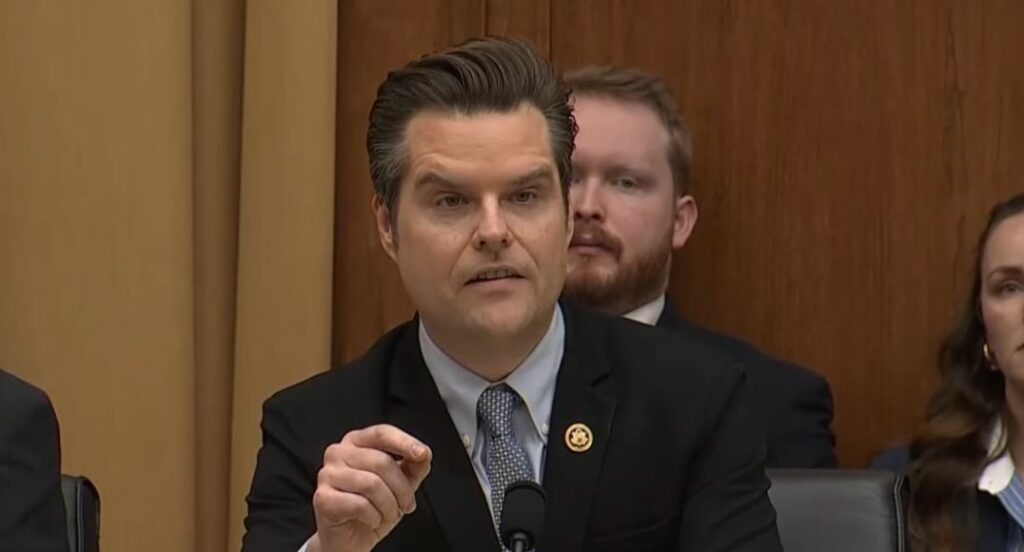In a recent development, Matt Gaetz has reacted vehemently to a report released by the House Ethics Committee concerning allegations against him, which he argues are part of a broader two-tiered justice system employed by the Biden administration’s Department of Justice (DOJ). Following the committee’s vote to make the report public, Gaetz utilized social media to debunk the claims made against him and highlight discrepancies in witness testimonies. According to Gaetz, one witness declared that she “never charged anyone anything,” leading him to question the interpretation of financial exchanges in relationships as prostitution. His tweet emphasized a pointed critique of how the report was unveiled, suggesting it was done strategically to suppress his ability to present robust defenses or challenge the witnesses in a legal setting.
Gaetz’s concerns center around the implications of the committee’s findings, as he argues they stem from a politically motivated agenda. He inferred that the timing of the report’s release, which occurred just before Christmas, served as a method to tarnish his reputation without providing him a fair opportunity to contest the accusations in a courtroom. He insisted that the nature of the relationship and financial exchanges described in the report should not constitute prostitution, arguing that providing financial support to someone in a romantic context is fundamentally different from engaging in sex work. His assertion signifies a broader narrative he cultivates regarding the political ramifications of the allegations and the unfair tactics he feels have been employed against him.
The congressman further strengthened his position by sharing additional witness statements that contradicted the accusations. In his tweets, he revealed that another individual claiming to be a ‘prostitute’ ultimately stated she was not engaged in sex work when pressed during depositions. This revelation pointed to what Gaetz considered a systematic omission of exculpatory evidence from the ethics report, suggesting a manipulative narrative aimed at discrediting him. Gaetz’s insistence that the ethics committee’s findings were biased reflected a larger sentiment among some conservatives who echo his critiques of perceived injustices within governmental investigations of partisan figures.
Moreover, Gaetz produced further testimony asserting he and another witness did not discuss monetary compensation, reinforcing his defense against the prostitution allegations. His claim that this testimony was purposely excluded from the report underscored his belief that the ethics investigation was marred by intentional bias. He asserted that there were no legal grounds to pursue charges against him; hence, the ethics report must be misconstrued or politically weaponized. This construction of events portrays Gaetz as a victim of a double standard, a narrative that has resonated within certain circles lacking faith in the impartiality of the institutions that govern ethical conduct in politics.
In addition to sharing his thoughts on Twitter, Gaetz amplified his argument by retweeting supportive messages from conservative factions, characterizing the ethics report as a tactically orchestrated hit against his political career. He indicated a belief that the ethics committee acted with ulterior motives—to undermine his standing within Congress—especially after he had resigned. This strategic maneuvering serves as a focal point in Gaetz’s broader narrative about political persecution, with the ethics report becoming emblematic of higher-stakes battles involving integrity, accountability, and the consequences of political rivalry.
Ultimately, Gaetz’s vocal public response to the House Ethics Committee report exemplifies a potent intersection of political discourse and personal defense within contemporary American politics. Accusations of two-tiered justice resonate not only in his case but also hint at larger systemic criticisms prevalent in the current political landscape. His assertions regarding the selective presentation of evidence and the motivations behind the ethics report continue to fuel his narrative of injustice while igniting conversations about the fairness of ethical inquiries and their potential manipulation for political gain. Through this lens, Gaetz positions himself not just as a confrontational figure but also as a rallying point for those questioning the integrity of political and legal institutions.

